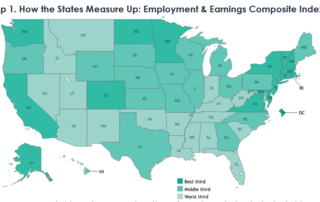
About Jennifer Clark
Jennifer Clark is the former Director of Communications for the Institute for Women’s Policy Research (IWPR), overseeing the Institute’s media relations, website development, publications production, and online communications efforts on a range of issues including women’s roles in the workforce, student parents in college, Social Security, paid sick days and paid family leave, and the status of women in the United States. In 2015, she spearheaded the public relations and external outreach strategy behind the 2015 relaunch of the Institute’s signature Status of Women in the States project, which garnered national coverage in The Washington Post, The Atlantic, The Wall Street Journal, CBS This Morning, and MSNBC’s Morning Joe, among others and inspired special features in Glamour Magazine and The Daily Show with Jon Stewart. She regularly provides strategic communications advice and media relations support to IWPR’s local partners and has presented on community outreach strategies at conferences, webinars, and events hosted by Women’s Funding Network, Women in Government, and Women’s Legislators’ Lobby/Women’s Actions for New Directions (WILL/WAND).
In between roles at IWPR, she served as the Income Security Outreach Manager at the National Academy of Social Insurance, managing a Social Security public education project, which coordinated a network of 30 organizations working to educate vulnerable populations on the importance of Social Security. She graduated from Boston University with a Bachelor of Arts in American History and International Relations.





